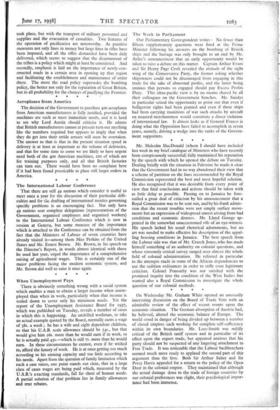Mr. Malcolm MacDonald (whom I should have included last week
in my brief catalogue of Ministers who have recently been conspicuously successful) fully maintained his reputation by the speech with which he opened the debate on Tuesday. Dealing briefly with the situation in Palestine he made it clear that the Government had in no way abandoned their view that a scheme of partition on the lines recommended by the Royal Commission represented the best and most hopeful solution. He also recognised that it was desirable from every point of view that final conclusions and actions should be taken with as little delay as possible. Passing on to Jamaica he fore- stalled a great deal of criticism by his announcement that a Royal Commission was to be sent out, and by his frank admis- sion that the recent troubles were not simply surface move- ments but an expression of widespread unrest arising from bad conditions and economic distress. Mr. Lloyd George ap- peared in the somewhat unaccustomed ?We of an eye-witness. His speech lacked his usual rhetorical adornments, but no art was needed to make effective his description of the appal- ling housing conditions in Jamaica. The best speech from the Labour side was that of Mr. Creech Jones, who has made himself something of an authority on colonial questions, and whose extremely critical survey ranged over almost the whole field of colonial administration. He referred in particular to the attempts made in some of the African dependencies to use the sedition ordinances in order to stifle even legitimate criticism. Colonel Ponsonby was not satisfied with the promised inquiry into the condition of the West Indies but wanted also a Royal Commission to investigate the whole question of our colonial methods. * * * *


















































 Previous page
Previous page